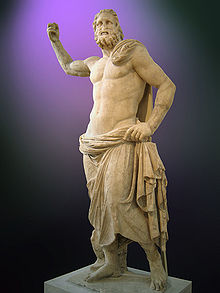Neptune Equester
| Poseidon | |
|---|---|
| God of the sea, earthquakes, soil, storms, and horses | |

Poseidon from Milos, 2nd century BC (National Archaeological Museum of Athens)
|
|
| Abode | Mount Olympus, or the Sea |
| Symbol | Trident, fish, dolphin, horse and bull |
| Personal Information | |
| Consort | Amphitrite |
| Children | Theseus, Triton, Polyphemus, Orion, Belus, Agenor, Neleus, Atlas |
| Parents | Cronus and Rhea |
| Siblings | Hades, Demeter, Hestia, Hera, Zeus, Chiron |
| Roman equivalent | Neptune |
Poseidon (/pəˈsaɪdən, pɒ-, poʊ-/;Greek: , pronounced [pose͜edɔ́͜ɔn]) was one of the Twelve Olympians in ancient Greek religion and myth. He was god of the Sea and other waters; of earthquakes; and of horses. In pre-Olympian Bronze Age Greece, he was venerated as a chief deity at Pylos and Thebes.
Poseidon was protector of seafarers, and of many Hellenic cities and colonies. In Homer's Iliad, Poseidon supports the Greeks against the Trojans during the Trojan War. In the Odyssey, during the sea-voyage from Troy back home to Ithaca, the Greek hero Odysseus provokes Poseidon's fury by blinding his son the Cyclops Polyphemus, resulting in Poseidon punishing him with storms, the complete loss of his ship and companions, and a ten-year delay. Poseidon is also the subject of a Homeric hymn. In Plato's Timaeus and Critias, the island of Atlantis was Poseidon's domain. His Roman equivalent is Neptune.
...
Wikipedia
